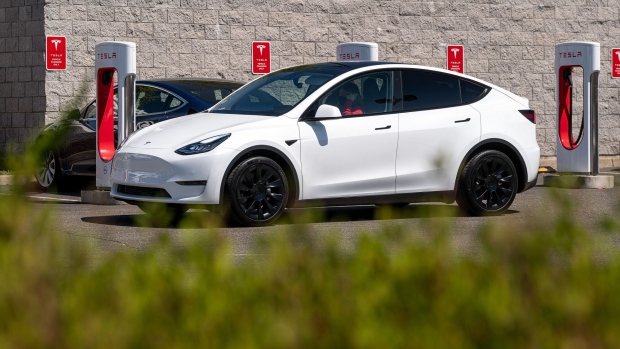Jun 27, 2024
Tesla’s Design Changes Confuse Drivers and Undercut EV Quality
, Bloomberg News

(Bloomberg) -- Tesla Inc. no longer stands above other electric vehicles in quality because head-scratching design changes on its cars, such as removing turn-signal stalks, have frustrated its owners and lowered its score in a bellwether quality survey.
Long the EV quality leader, Tesla now is on par with rivals such as Rivian Automotive Inc. and the battery-powered models of legacy automakers like General Motors Co., according to J.D. Power’s Initial Quality Study for the 2024 model year that was released Thursday.
Tesla owners complained about changes made to basic functions, like window controls and the horn, which Tesla moved from the center of the steering wheel to a button on the spoke of the wheel in some models. The EV maker also removed turn-signal stalks on some models and put directional arrow buttons on a spoke of the steering wheel instead.
“It’s not being well received,” Frank Hanley, J.D Power’s senior director of auto benchmarking and author of the study, said in an interview. “In an emergency situation when you have to hit the horn, you don’t necessarily want to have to think about it. We see customers commenting that eyes-off-the-road time is increasing because they have to hunt around.”
Car buyers and automakers closely watch J.D. Power’s quality study, a long-time measure of the reliability of cars in the first three-months of ownership. This year, J.D. Power added data on how often owners visit car dealers for repairs and information on features like rear emergency braking and back seat reminders, Hanley said. That makes it impossible to directly compare last year’s scores with this year, he said.
Ram, Stellantis NV’s truck and van division, topped the rankings, with 149 problems per 100 vehicles, followed by GM’s Chevrolet model line and Hyundai Motor Co.’s namesake brand. Porsche was the top luxury maker with 172 problems per 100 vehicles, followed by Toyota Motor Corp.’s Lexus line and Hyundai’s Genesis premium brand.
The industry average this year was 195 problems per 100 vehicles. Stellantis’ Dodge model line, with 301 problems, was at the bottom of the list of manufacturers that didn’t only make EVs.
But the pure EV makers scored low on the quality rankings. Tesla and Rivian both had 266 problems per 100 vehicles, while Polestar had the most of any of the brands, at 316 problems per 100 vehicles.
EVs in general have lower quality than traditional internal combustion engine vehicles. While EVs have fewer parts to break down, they also tend to be loaded with new technology that can go wrong, Hanley said.
In fact, he said, EV owners “are experiencing problems that are of a severity level high enough for them to take their new vehicle into the dealership at a rate three times higher than that of gas-powered vehicle owners.”
As a company, GM performed the best, receiving six awards for having models score at the top of their segment, including the Chevy Equinox ranking as the most problem-free compact sport-utility vehicle and the Chevy Silverado as the top heavy duty pickup truck.
Ford Motor Co., which is on a push to improve quality and reduce warranty repair costs that hit $4.8 billion last year, saw improvement in its namesake brand, which ranked ninth overall and was above the industry average. However, its Lincoln luxury line was below average, pulled down by quality problems with the Nautilus SUV Ford is now making in China and shipping to the US, Hanley said.
Ford’s redesigned F-150 pickup truck, its top seller, was not included in this year’s J.D. Power study, Hanley said, because the automaker held 60,000 of them for extra quality checks in the first quarter. That omission cut both ways for Ford because the gas-fueled F-150 typically has good quality, while the electric F-150 Lightning has been sub-par, Hanley said.
©2024 Bloomberg L.P.





